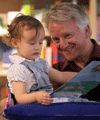September
Reading crisis facing UK's children

One and a half million children will reach the age of 11 unable to ‘read well’ by 2025 unless urgent action is taken to tackle the reading crisis facing Britain’s pupils, according to new research.
The worrying situation has prompted leading charities, teachers, parents and businesses to form a coalition called ‘Read On. Get On.’ Today, they are launching a national mission to support parents and teachers to get all 11 year olds reading well* by 2025, meaning they can read, understand and discuss stories, such as Harry Potter. The move has also been backed by publishers and their bestselling authors.
As part of this research, Save the Children commissioned Professor James Law and statistician Tom King, of Newcastle University, to carry out analysis of the UK’s Millennium Cohort Study of 18,000 children born in 2000 and assessed at regular intervals.
“What happens beyond the school gates and at home is critical,” says Prof Law. “Our work for this report shows that reading to and with children matters for both mothers and fathers, but the impact of father’s reading – particularly to children after they have started school – appears even greater.
“Children whose fathers read with them less than once a week at the age of five had, by the time they were seven, a reading level six months behind those who had been read to daily.”
He also found that children in homes with more than 500 books are on average more than two years ahead of those growing up in households with fewer than ten books.
A report by the coalition shows that England is one of the most unequal countries when it comes to children’s reading levels, second only to Romania in the EU. The gap between the strongest and weakest readers is equivalent to seven years of schooling. The report calls for a concerted effort from all corners of society.
The most comprehensive study of pre-school and primary school-aged children in a generation found disadvantaged children are the worst affected, with four in ten not reading well by the age of 11 – almost double the rate of their better off peers. The report, which uses current data and that from the past decade, also found they are not reading enough outside school, or with their fathers.
Research commissioned for this report, including by Newcastle University, CentreForum, National Foundation for Educational Research and the National Literacy Trust, also finds:
- GDP in 2025 could be £32 billion higher if action had been taken to ensure all children were reading well by the age of 11
- A wide ‘book gap’ in the UK has emerged, with almost a quarter of 11 year olds in the poorest families having fewer than ten books in their home
- While books remain popular, the most commonly read material by children is now text messages with websites and e-books also growing in popularity
Read On. Get On aims to create a nation of strong readers by:
- Supporting parents to read with young children for ten minutes a day
- Urging the public to volunteer to help disadvantaged children improve their reading
- Building a powerful coalition of the county’s most influential public, private and charitable organisations to pledge to support the mission
- Urging all political parties to support the 2025 target and two interim 2020 goals
The report, Read On. Get On. – How Reading Can Help Children Escape Poverty, is based on new analysis of data by Newcastle University (using data from the Millennium Cohort Study), Centre Forum (using data from 2013), the National Literacy Trust (using data from 2005-2013) and the National Foundation for Educational Research (using data from 2011).
The coalition’s core members are: Save the Children; National Association of Head Teachers (NAHT); Booktrust; Beanstalk; Publishers Association; The Reading Agency; Teach First; National Literacy Trust; I CAN; Harper Collins; Achievement For All.
?*‘Reading well’ by the age of 11 means that children should not only be able to read the words that are written down, but they should also have a wider understanding of the meaning behind stories and information and be able to talk about them and comment on them. As well as being able to read and understand books such as Harry Potter or Treasure Island, they should also be able to read a range of different materials, including magazines and newspapers, many websites, letters and dictionaries.
published on: 8 September 2014
